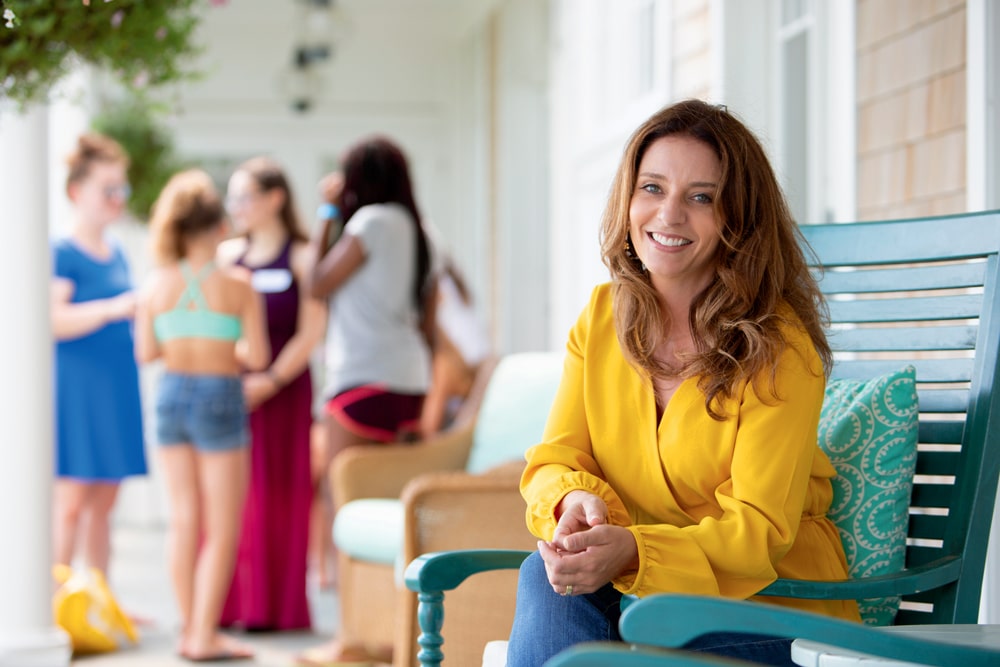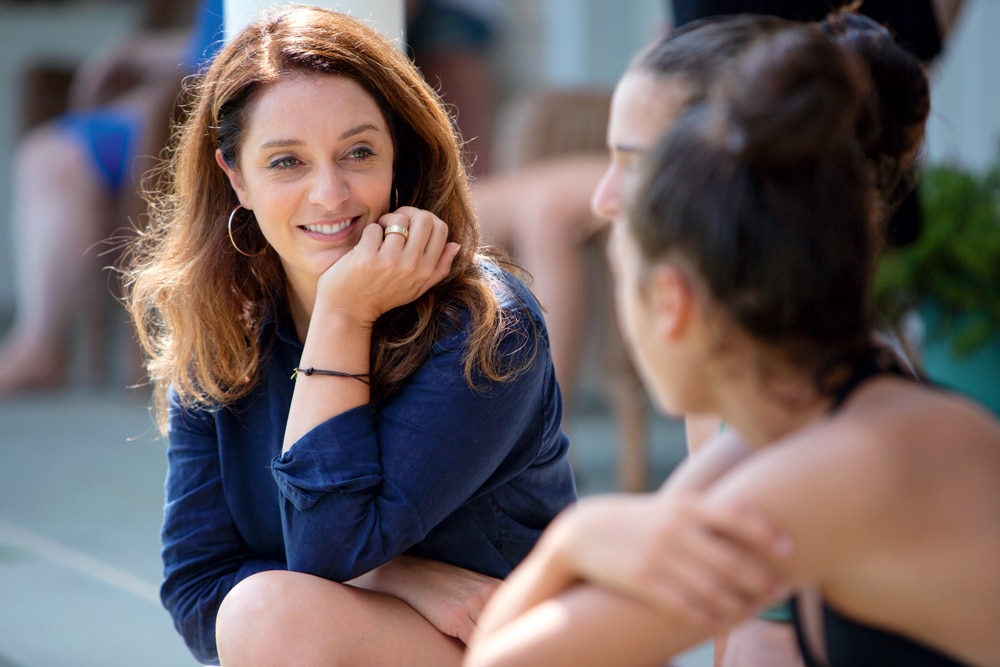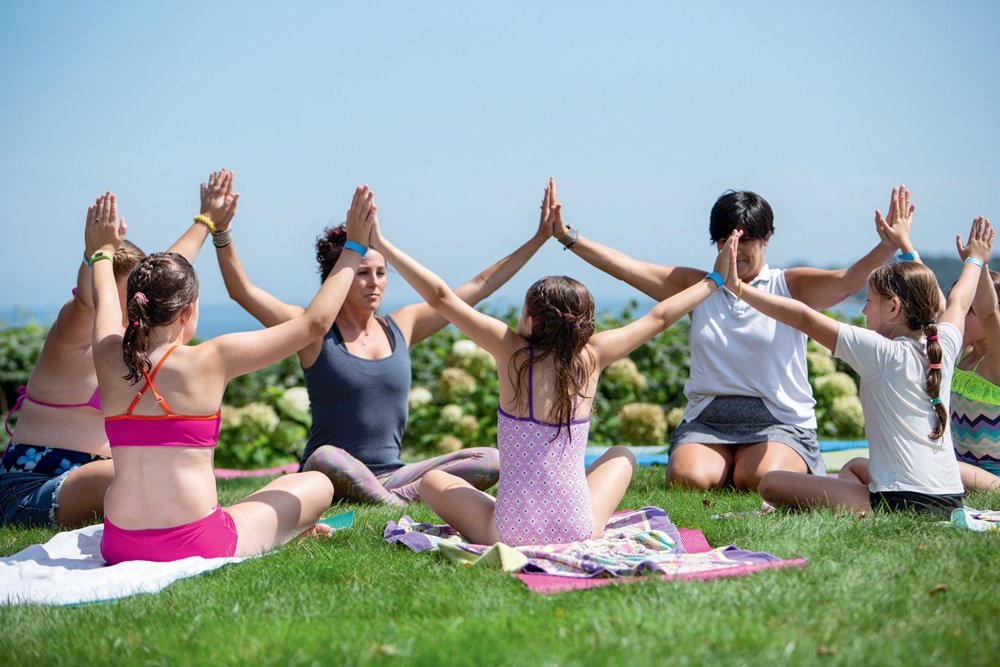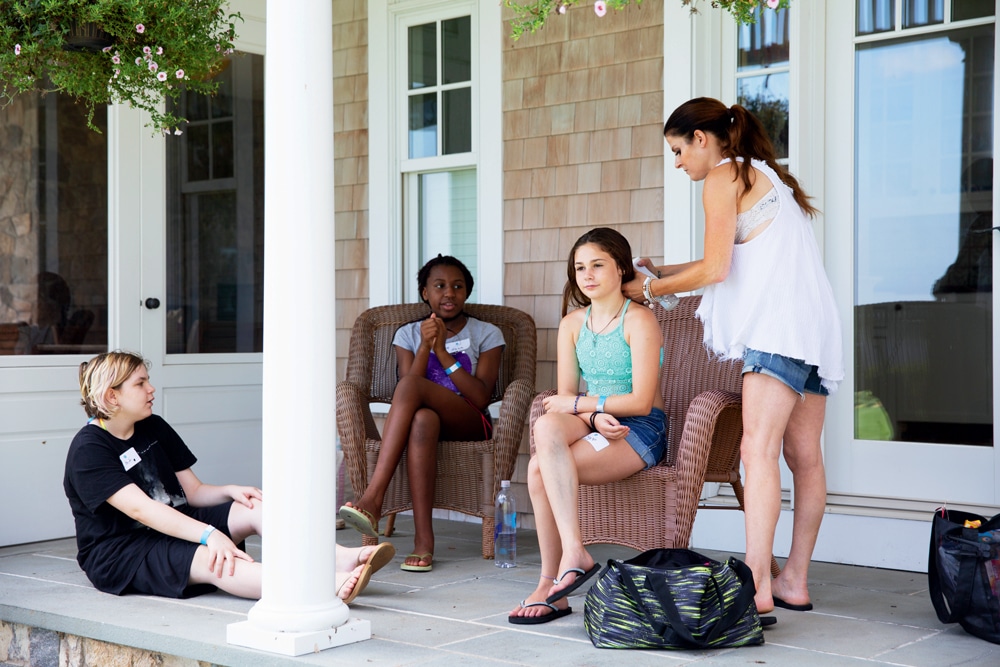Girl Power in New England | Cara Belvin and EmpowerHer
Reaching out to girls who have lost their mothers, Cara Belvin is on a deeply personal mission to help them open up to others and reconnect with joy. Learn more about Cara and her nonprofit EmpowerHer.

In the spring of 2013, a mutual acquaintance introduced Cara Belvin to Emeline Berry, and the two struck up an unlikely friendship. Cara was 36, married with two young children, and running a successful nonprofit consulting agency out of her home in Scituate, Massachusetts. Emeline was a newly minted ninth-grader who lived nearby and had dreams of working in medicine. She was also struggling: Not long before, her mother had died unexpectedly of a heart attack. Even with a loving father and a protective older brother at her side, Emeline felt alone and unsure of how to move on with her life.
“I was known as the girl whose mom had died,” she recalls. “I felt these things that I didn’t think anyone else did—the kind of sadness I felt, or when I was happy, suddenly feeling guilty about feeling that way.”
But Cara understood. When she was 9, her own mother had died of breast cancer. Like Emeline, Cara, who grew up in Southington, Connecticut, had a caring family to fall back on, yet it wasn’t enough. Sometimes it felt as if her mom had never existed. Friends, parents, and even teachers avoided mentioning Cara’s mother or asking about the grief that Cara was quietly but painfully sorting through.

“People are afraid to offer support [to a child who’s lost her mother] because they’re afraid to step on the father’s shoes,” says Cara, who holds a master’s in psychology and worked for several years as a children’s psychologist. “They don’t want to suggest that he’s not enough. If she looks good, if she’s playing sports, if she’s getting good grades, if she’s got a ton of friends, they don’t want to rock the boat. They figure she must be doing fine. But just below the surface, she’s carrying a heartache that is unbearable.”
In Cara Belvin, Emeline found a maternal figure, someone she could open up to. They went out for ice cream, went shopping, and talked about their mothers. “She made me feel like I was normal,” says Emeline, “that I wasn’t the only one who’d gone through this.”

Photo Credit : Casey Atkins
Cara got something from it too. As she talked to friends about her experiences with Emeline, they told her about the motherless daughters they knew who were looking to connect with others like themselves. She also found more women like her who wanted to help. But there wasn’t any organization to connect the two groups. So, in August 2013, Cara put her long history in nonprofits to work and launched EmpowerHer.
It began with a simple mission: to find girls who’d suffered the early loss of their moms and bring them together on Mother’s Day weekend, often the most emotionally charged time of the year. Seven attendees, including Emeline, turned out for the inaugural event in Boston in 2014. They splashed around in the hotel pool, browsed the shops on Newbury Street, and went out for a fancy dinner. On the morning of Mother’s Day, the group did yoga together and then said a teary good-bye. As she watched the girls depart, Cara knew she couldn’t wait a whole year before doing something again.

Photo Credit : Casey Atkins
“They didn’t know each other, but they instantly connected,” she says. “It was magical and unbelievable. They didn’t talk about when their mom died or her favorite recipe—that’s what they do in support groups. They just got to be girls, and discover other girls who were like them, going through some of the same things.”
That summer, Cara, who’s as comfortable with constructing org charts as she is with thinking big, threw herself into building EmpowerHer. She spread her message quickly, eventually recruiting more than 250 volunteers to her cause.
Today, the nonprofit holds more than a dozen events throughout the year. There are beach parties and writing classes, cooking sessions and back-to-school shopping afternoons. They practice yoga and learn to surf. Each spring and fall, EmpowerHer hosts “Real Talk” discussions, in which older girls can talk openly about sensitive subjects like sex and dating. Cara and her team also carefully select and train adult mentors to pair with the program’s participants. In all, the organization, which is largely funded through private donations, works with 140 girls from across Massachusetts.

Photo Credit : Casey Atkins
EmpowerHer’s success stems from what it’s not. The nonprofit is not a therapeutic organization. The staffers, who work out of a small office in Norwell, don’t profess to be counselors. Instead, Cara, who now serves as paid executive director, aims to give these girls what she struggled to find in the years after her mom’s death: the realization that she was more than just “the girl whose mother died.”
“She’s giving these girls superpowers,” says Jenn Donovan, an EmpowerHer mentor. “They are confident and have so much strength. They have a reason to move forward each day, and Cara’s helped give that to them.”

Photo Credit : Casey Atkins
Cara would like to give even more. This year EmpowerHer opened chapters in Rhode Island, Connecticut, and New York. She wants to do the same throughout the rest of the country, to help more motherless daughters like Emeline—who this fall followed in her mother’s footsteps and started nursing classes at Curry College in Milton, Massachusetts.
Cara can speak at length about what those success stories mean to her. But she also readily acknowledges that her work has helped her manage her own grief, which has lingered for more than three decades.
“I spent 10 years in therapy in my 20s, but this is the most healed and healthy I’ve ever been,” she says. “I believe what really fuels your soul is service to others. This was my fight. There was nothing more personal than this. I have more conviction around [EmpowerHer] than anything I’ve ever done. It’s been an incredible journey.”
For more information, go to empoweringher.org.
* * * * *
ANGELS AMONG US, THEN AND NOW
A quick revisit of some New England community difference-makers that we’ve profiled over the past 12 years:
Wynona Ward, Have Justice Will Travel: This year marks the 20th anniversary of the free legal clinic launched by Ward, a trucker turned attorney, to aid victims of domestic abuse in rural Vermont. havejusticewilltravel.org
Jodi Wheeler, H.O.P.E.: Launched in 2004, this homegrown charity is going strong: Last year it provided more than $200,000 in clothing, school supplies, and other essentials to people in more than 30 Vermont towns. hopevermont.com
Dick Cyr, David’s House: As president emeritus, Cyr still serves the organization he founded in his son’s memory in 1986: a home away from home for families with children at New Hampshire’s Dartmouth-Hitchcock Medical Center. davids-house.org
Tina Chéry, Louis D. Brown Peace Institute: Chéry remains a powerful force in helping the Boston community strive for peace and unity. In 2017, the Barr Foundation, which recognizes exceptional city leaders, named her a fellow and donated $100,000 to her group. ldbpeaceinstitute.org
Ashley Stanley, Lovin’ Spoonfuls: Since 2010, Stanley’s team has rescued and distributed more than five million pounds of fresh food to needy families across Massachusetts. lovinspoonfulsinc.org
Susan Rodgerson, Artists for Humanity: Envisioned as a way to create work for inner-city youth in art and design, AFH is today one of the largest teen employers in Boston, with some 500 kids a year participating in its programs. afhboston.org
Marquis Taylor and Pete Berman, Coaching 4 Change: Over the past four years, Taylor and Berman’s basketball-based mentoring program in Brockton, Massachusetts, has seen a 97 percent high school graduation rate among its participants. c4cinc.org
Dave Cote, the Summit Project: Cote stills serves as board president for his 2013 nonprofit, which honors Maine service members killed in the line of duty, but is also pursuing his MBA at Boston College, where he’s involved with various veterans’ programs. thesummitproject.org
Ian Aldrich
Ian Aldrich is the Senior Features Editor at Yankee magazine, where he has worked for more for nearly two decades. As the magazine’s staff feature writer, he writes stories that delve deep into issues facing communities throughout New England. In 2019 he received gold in the reporting category at the annual City-Regional Magazine conference for his story on New England’s opioid crisis. Ian’s work has been recognized by both the Best American Sports and Best American Travel Writing anthologies. He lives with his family in Dublin, New Hampshire.
More by Ian Aldrich

